PRINCETON, NJ -- For the first time in Gallup trends since 2000, a majority of Americans say it is not the federal government's responsibility to make sure all Americans have healthcare coverage. Prior to 2009, a majority always felt the government should ensure healthcare coverage for all, though Americans' views have become more divided in recent years.
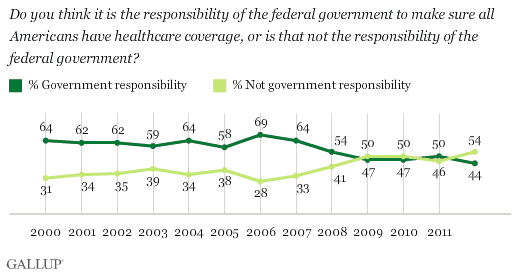
The current results are based on Gallup's annual Health and Healthcare poll, conducted Nov. 15-18 this year.
The shift away from the view that the government should ensure healthcare coverage for all began shortly after President Barack Obama's election and has continued the past several years during the discussions and ultimate passage of the Affordable Care Act in March 2010. Americans are divided on that legislation today -- 48% approve and 45% disapprove -- as they have been over the last several years.
Republicans, including Republican-leaning independents, are mostly responsible for the drop since 2007 in Americans' support for government ensuring universal health coverage. In 2007, 38% of Republicans thought the government should do so; now, 12% do. Among Democrats and Democratic leaners there has been a much smaller drop, from 81% saying the government should make sure all Americans are covered in 2007 to 71% now.
One thing that has not changed is that Americans still widely prefer a system based on private insurance to one run by the government. Currently, 57% prefer a private system and 36% a government-run system, essentially the same as in 2010 and 2011. Prior to the passage of the Affordable Care Act in 2010, the percentage of Americans in favor of a government-run system ranged from 32% to 41%.
Views of Healthcare System Becoming Less Negative
Currently, 67% describe the U.S. healthcare system as either being in a state of crisis (16%) or having major problems (51%). However, that is a less negative assessment than in prior years and the lowest percentage saying the system has major problems or is in crisis since 2004. Americans have typically viewed the U.S. healthcare system as having major problems or being in crisis, which has been the majority view every year except 2001, shortly after the Sept. 11 terror attacks.
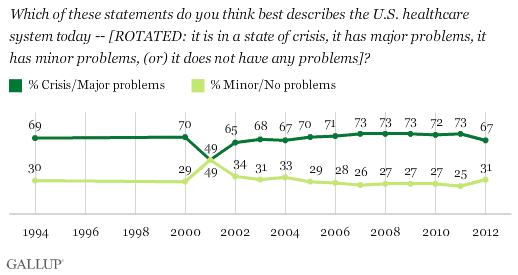
When assessing Americans' more specific evaluations of the healthcare system, the major concerns focus on cost and coverage.
Americans are widely dissatisfied with the cost of healthcare in the U.S.: 22% are satisfied and 77% are dissatisfied. Satisfaction has never been higher than 28% in 13 separate measurements since 1993.
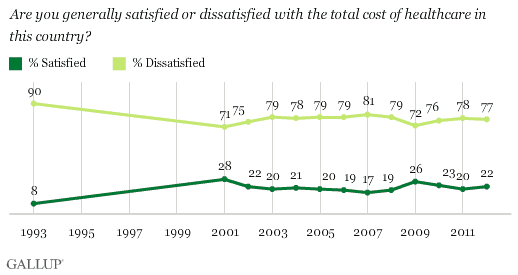
Additionally, 41% rate healthcare coverage in the U.S. positively -- as excellent or good -- while a combined 58% say coverage is only fair or poor. Since 2001, the percentage rating healthcare coverage positively has been as low as 21%, while the current rating of 41% is the least negative to date. Thus, Americans are still more pessimistic than optimistic about U.S. healthcare coverage, though that pessimism has decreased in recent years.
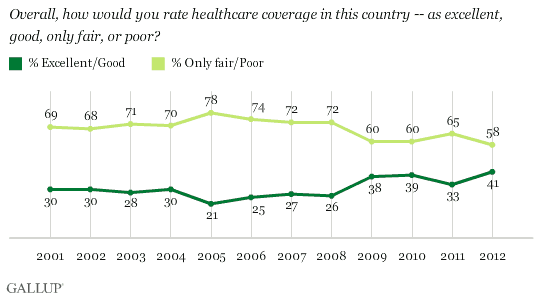
One aspect of the U.S. healthcare system Americans are generally positive about is quality -- 62% rate it as excellent or good. That ties as the best rating of U.S. healthcare quality Gallup has measured since it began tracking this item in 2001, though excellent/good ratings of quality have never dropped below 53%.
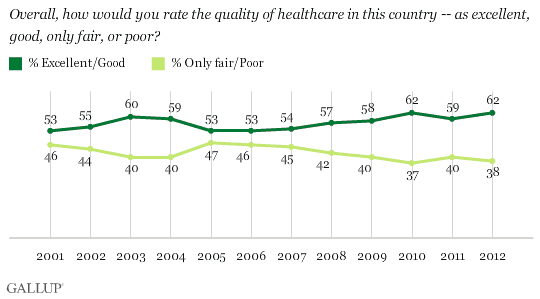
Implications
Over the next few years, the U.S. healthcare system will undergo significant changes as more parts of the Affordable Care Act go into effect. To date, the passage of the law has not led to a major transformation in U.S. healthcare attitudes, apart from the shift away from the view that the government should ensure all Americans have healthcare.
However, this year's Health and Healthcare poll could signal the beginning of somewhat less negative views of the U.S. healthcare system. Americans have always been positive about the quality of healthcare they receive. Though they remain more negative than positive about healthcare coverage, Americans' opinions are trending toward a more positive view of health coverage. Americans remain broadly dissatisfied with U.S. healthcare costs, and it is unclear at this point whether the healthcare reforms will significantly reduce U.S. healthcare costs once the law is fully implemented.
Survey Methods
Results for this Gallup poll are based on telephone interviews conducted Nov. 15-18, 2012, with a random sample of 1,015 adults, aged 18 and older, living in all 50 U.S. states and the District of Columbia.
For results based on the total sample of national adults, one can say with 95% confidence that the maximum margin of sampling error is ±4 percentage points.
Interviews are conducted with respondents on landline telephones and cellular phones, with interviews conducted in Spanish for respondents who are primarily Spanish-speaking. Each sample includes a minimum quota of 400 cellphone respondents and 600 landline respondents per 1,000 national adults, with additional minimum quotas among landline respondents by region. Landline telephone numbers are chosen at random among listed telephone numbers. Cellphone numbers are selected using random-digit-dial methods. Landline respondents are chosen at random within each household on the basis of which member had the most recent birthday.
Samples are weighted by gender, age, race, Hispanic ethnicity, education, region, adults in the household, population density, and phone status (cellphone only/landline only/both, cellphone mostly, and having an unlisted landline number). Demographic weighting targets are based on the March 2011 Current Population Survey figures for the aged 18 and older population living in U.S. All reported margins of sampling error include the computed design effects for weighting.
In addition to sampling error, question wording and practical difficulties in conducting surveys can introduce error or bias into the findings of public opinion polls.
View methodology, full question results, and trend data.
For more details on Gallup's polling methodology, visit https://www.gallup.com/.
